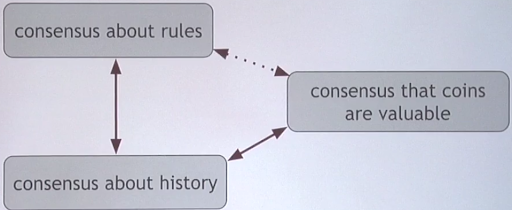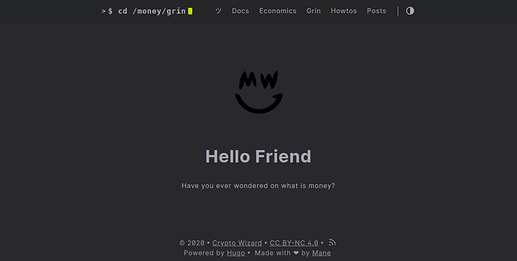Continuing the discussion from Dismantling the core team and governance structure:
I just want to add a few notes which I found useful regarding the consensus and the centralization/decentralization trade-off. I am a bit slow to write and I don’t have too much time, so I will summarize some points that are important to me, rather than a detailed writing.
As far as I know, to achieve a general consensus a blockchain must hold at the same time three different types of consensus:

Consensus about the rules
This kind of consensus regards the general rules about the protocol such as the emission rate, the block size, the time between blocks, the consensus algorithm, etc. This is mostly a matter of developers, or at least, of whose able to understand the protocol at a technical level and can write code – code is law. Other participants can only partially interact with this consensus.
But, because it’s based on cryptography, thermodinamics, economics and code, when the system is ready, there won’t be necessary too much changes, if the protocol is aligned with principles. Indeed, this is why I suggested developers to strenghten principles, before other forces come in:
- without security we cannot have value (with this regard, someone can explain me why Rust is said to be more secure than C++ and other languages? And also which problems arise on consensus compatibility when there are more implementations?).
- without freedom we cannot have the three basic human rights, to move, speak, exchange (censorship).
- without privacy we cannot have fungibility, then we cannot have cash.
- without simplicity less skilled people would be cut off, so the protocol would be less fair and inclusive.
- without fairness the entire “cake” shrinks and people would prefer to use other systems.
- without inclusivity the system closes in on itself.
- without decentralization, we cannot have securece in the long term.
- without scalability we cannot have decentralization and mass adoption.
- without altruism donations are not possible and we would remain stuck in voting systems (which are interesting, but the prof of work is itself a voting system, where property of keys is the identity, and the work of machines is the right to decide).
Of course, this is the most difficult task, because what are value? Security? Freedom? Privacy?.. How they can be traslated into the protocol? They can be seen as trade-offs, because tied with subjectivity of people. This is what makes the discussion so difficult, without considering that each trade-off requires an high level of knowledge in really different fields.
A possible approach to mitigate the asymmetry of knowledge could be something circular. If developers can focus on strenghtening the rules and the principles at the protocol level, while the community’s participants focus on learning, observing where the project is going, and on creating new services, there would be less burden between both parts.
The community could make its voice heard, produce documents, debate about important questions while making readible content for others, whereas developers could look at the documents produced by the growing environment and decide the trade-offs to implement through rules. Knowing which are the rules and why they exist is the prerequisite for agreeing with them.
Consensus about the history
This consenus is related to who owns the coins, that is, the transaction history. In other words, how the property of the keys is exchanged along time between participants and stakeholders (who have skill in the game). Indeed, distribution of coins is another thing that is important to consider in the long run, because it will determine the supply and demand side of the price equation at some point. So who are the actors involved in the protocol and in the distribution of coins?
- developers
- miners
- mining polls
- community
- wallets
- exchanges
- merchants (price taker)
- entrepreneurs (new services)
- investors (hoarder)
- speculators (price makers)
All these components should work synergically and all should take part in some way in the consensus process, while following rules and principles. Importantly, they should have a secure way to possess grins throughout the distribution. At the moment, people have these options to acquire coins, and probably they all should be refined.
-
mining: this is a good and private way to have grins, but not everyone have the skills or experience to invest in this business. Only developers can access this, furthermore, future ASICs add uncertainty for miners.
-
exchange buy: buying at exchanges is feasible and in the future probably more exchange will accept grin. However, it is not private and it is risky (Kucoin has been recently hacked) because you have to rely on a third part.
-
sell products/services: you can produce and sell products or services for grin, but for now I don’t see this feasible. There are problems with trust in this kind of exchanges and I guess they need an underlying structure to work.
-
accept donations: last but not least, people could accept donations for their work. I think this option is often undervalued. It could be private and reflects the interests of the community while resolving the problem of the general fund. Indeed, I suggest to use some resources to build tools that are secure, private, easy and free to accept donations (something similar to BTCpay server).
Consensus about value
This consensus is the consequence of the first two types of consensus. When people agrees on rules and on history, the coins start to gain value. This depends mostly on the product fit that the protocol satisfy and/or its usabilty, which in the case of grin I think is money.
All the three type of consensus are weak for grin. However, this could be an advantage right now because nobody is caring about grin and the “wasps’ nest” is focused on other things. This gives the possibility to build a solid infrastrucure and distribute grins without being compromised by influential forces. These times are also great because there is not too much speculation, so people interested in grin can concentrate on other things rather than price.
Sub-teams
Premise: For those interested in creating a group, here you can find something useful for the formation of sub-teams.
@Anynomous I would be happy to be a part of a sub-team and I like the name! But there is a spell that is less privacy invasive?  Don’t know, something like the “informous spell” for example. Also because, I don’t know if quantify wants or needs is possible, and because I don’t think money should be driven by community’s needs, but rather by its functions.
Don’t know, something like the “informous spell” for example. Also because, I don’t know if quantify wants or needs is possible, and because I don’t think money should be driven by community’s needs, but rather by its functions.
However, I like the idea! what I was thinking about is something similar, something that can be useful for the community. Regarding surveys and polls I was thinking to ask generally about the willingness to contribute, skills, expertise, important principles, etc., so that, as you said, there is a clearer direction and vision.
I think that there are a lot of people that don’t know what to do, and asymmetry on knowledge prevent them to act. Also because there is too much to know and topics are very difficult, but this is where a community can shine! Every help can make the difference.
With this in mind, I am trying to make a site with Hugo and blogdown, containing more detailed articles about these topics. Writing in R markdown is also suitable for scientific papers and I found it good. Now I will have to start filling it, when it is ready I will upload it online.
Unfortunately, I have not too much time because I’m starting a new job, so it will take time. I would continue to write on weekends on this website (I do what I can) about my idea to gradually bring more decentralization and other stuff.
Feel free to add things on the lists or correct me!

 Don’t know, something like the “informous spell” for example. Also because, I don’t know if quantify wants or needs is possible, and because I don’t think money should be driven by community’s needs, but rather by its functions.
Don’t know, something like the “informous spell” for example. Also because, I don’t know if quantify wants or needs is possible, and because I don’t think money should be driven by community’s needs, but rather by its functions.